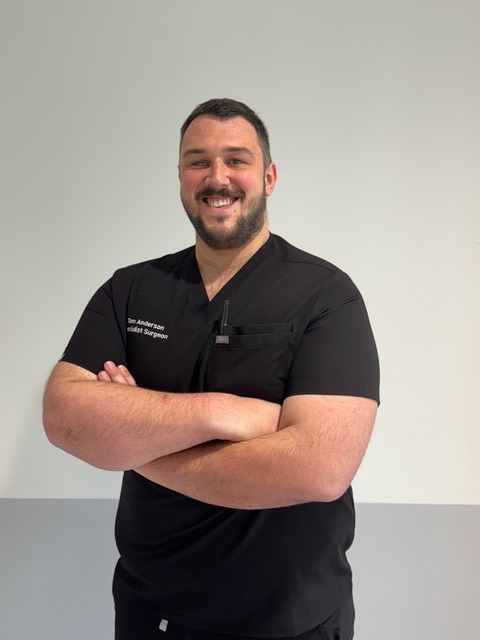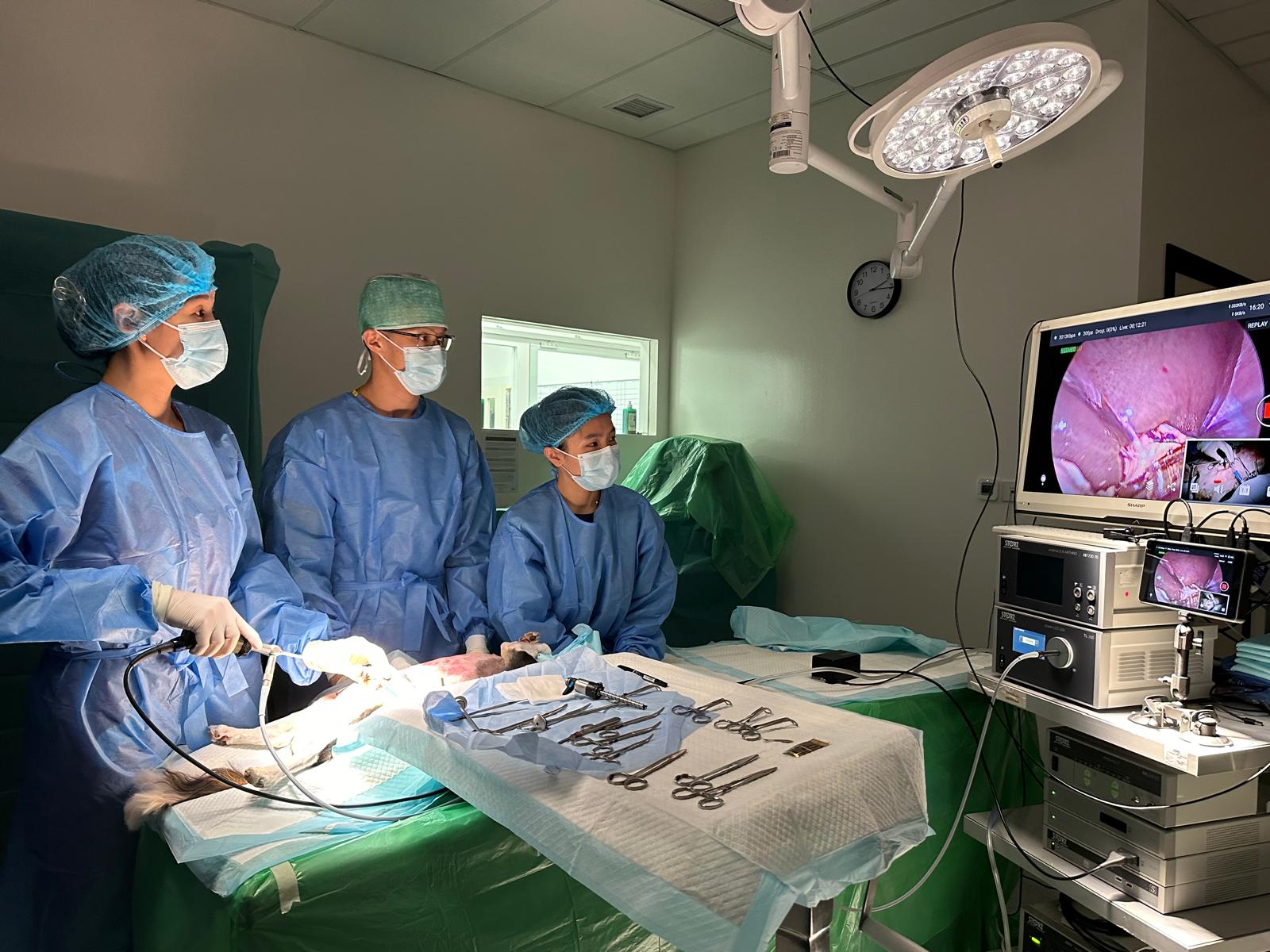

Veterinary surgery plays a vital role in restoring your pet’s health and mobility, treating a range of conditions from injuries to illnesses. At Beecroft, we are dedicated to providing the highest standard of veterinary surgical care, utilising advanced techniques and compassionate expertise to ensure the best possible outcome for your companion.
The Beecroft surgery team is headed by Dr Patrick Maguire, a Diplomate of the American College of Veterinary Surgeons. He has more than 10 years of surgical experience, and at the hospital, he is supported by a full staff of interns, critical care veterinarians, and licensed veterinary technicians. Additionally, our state-of-the-art diagnostic imaging service and cutting-edge rehabilitation team help our patients recover safely and return to a high quality of life through post-operative therapy and monitoring.


Dr Tom Anderson is a board-certified specialist small animal surgeon at Beecroft Animal Specialist & Emergency Hospital in Singapore. Dr Tom has extensive experience in the management of routine and complex soft-tissue and orthopaedic cases. He completed his surgical training at Dick White Referrals, Cambridge, UK – one of the largest and busiest veterinary surgical referral centres in Europe – where he remained as a specialist surgeon before joining Beecroft in 2025.
In addition to clinical work, Dr Tom contributes to the field of small animal surgery through publishing in the peer-reviewed literature and lecturing both nationally and internationally.




Our surgeons specialise in treating injuries to bones, joints, and the spine. We use state-of-the-art techniques — such as bone plating, pinning, and fixation devices — and work closely with our rehabilitation service to provide a comprehensive approach to diagnosis, treatment, and recovery. Our goal is to treat your pet safely and effectively and return them to high levels of mobility and quality of life.
Soft tissue surgery treats diseases of the chest, abdomen, skin, and other soft tissues. This includes the removal of tumours and foreign bodies.
Our surgeons specialize in injuries of bones, joints, and the spine. We use state-of-the-art techniques – such as bone plating, pinning, and fixation devices – and work closely with our Rehabilitation service to provide a comprehensive approach to diagnosis, treatment, and recovery. Our goal is to treat your pet safely and effectively and return them to high levels of mobility and quality of life.
Some common orthopedic procedures we perform at Beecroft include:
Our surgeons specialize in injuries of bones, joints, and the spine. We use state-of-the-art techniques – such as bone plating, pinning, and fixation devices – and work closely with our Rehabilitation service to provide a comprehensive approach to diagnosis, treatment, and recovery. Our goal is to treat your pet safely and effectively and return them to high levels of mobility and quality of life.
Some common orthopedic procedures we perform at Beecroft include:
Our surgeons specialize in injuries of bones, joints, and the spine. We use state-of-the-art techniques – such as bone plating, pinning, and fixation devices – and work closely with our Rehabilitation service to provide a comprehensive approach to diagnosis, treatment, and recovery. Our goal is to treat your pet safely and effectively and return them to high levels of mobility and quality of life.
Some common orthopedic procedures we perform at Beecroft include:
Our surgeons specialize in injuries of bones, joints, and the spine. We use state-of-the-art techniques – such as bone plating, pinning, and fixation devices – and work closely with our Rehabilitation service to provide a comprehensive approach to diagnosis, treatment, and recovery. Our goal is to treat your pet safely and effectively and return them to high levels of mobility and quality of life.
Some common orthopedic procedures we perform at Beecroft include:






Our team of highly skilled veterinary surgeons has extensive experience in a wide range of surgical procedures. We will ensure your pet receives the individualised care and attention they deserve in a calm and supportive environment, making their experience as stress-free as possible.
Beecroft Hospital boasts state-of-the-art surgical suites equipped with advanced technology, including precision instruments and monitoring systems, to ensure the safety and success of your pet’s procedure.
We offer a comprehensive range of veterinary surgical services, from routine procedures to complex surgeries. Our collaborative approach integrates diagnostics, like veterinary MRI scans, surgery, and comprehensive canine and feline rehabilitation services to provide your pet with complete care throughout its journey to recovery.
We understand that it can be worrying when your pet needs veterinary surgery, but rest assured, our team is here to support you and your companion every step of the way. Here is what you can expect if your pet needs surgery:
While age is a factor to consider, many older pets can safely undergo surgery. Our veterinary surgeons will carefully assess your pet’s overall health, including any pre-existing conditions, to determine the risks and benefits of surgery and advise you on the best course of action.
The preparation requirements will differ depending on the type of surgery and the condition of your pet. Our veterinary surgeons will provide specific instructions on how to prepare your pet for surgery, which may include fasting for a certain period before the procedure and withholding certain medications.
In most cases, your pet will need to fast for several hours before surgery to prevent complications with anaesthesia. However, your veterinary surgeon will provide specific instructions regarding fasting and water intake to ensure your pet’s safety and comfort throughout the procedure.
Yes, general anaesthesia is typically used during surgery to keep your pet comfortable and pain-free. Our experienced veterinary team carefully monitors your pet’s vital signs throughout the procedure to ensure their safety.
We prioritise your pet’s comfort and use a multimodal approach to pain management during and after veterinary surgery. This includes using local anaesthetics, pain medications, and, in some cases, nerve blocks. We will also provide pain relief medication for you to administer at home after the surgery if it is required.
Yes, follow-up appointments are essential to monitor your pet’s healing progress, remove sutures if necessary, and address any concerns. However, the frequency of these appointments will depend on the type of surgery and your pet’s individual needs, so your attending veterinary surgeon will advise you accordingly.
The recovery time varies depending on the type of surgery and your pet’s individual factors. For example, a routine spay surgery may require a couple of weeks for recovery, while a more complex orthopaedic procedure could take several months. Your veterinary surgeon will provide a personalised recovery plan and estimated timeline.
As with any surgical procedure, there are risks involved. These can include complications with anaesthesia, infection, or bleeding. However, our passionate veterinary team takes every precaution to minimise these risks and will discuss them with you in detail before the surgery to ensure that you and your pet are comfortable with the procedure.
Depending on the surgery, your pet may benefit from physical therapy or rehabilitation to aid in their recovery and restore their mobility. Our dedicated veterinary rehabilitation team can create a customised plan to help your pet regain strength and mobility to live life to the fullest.